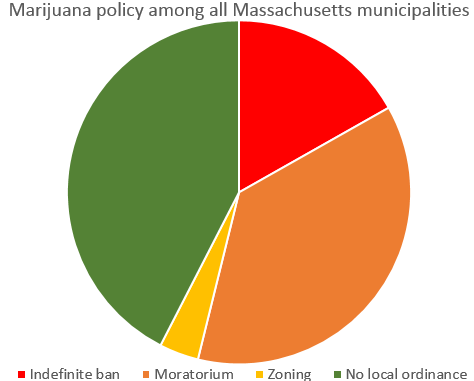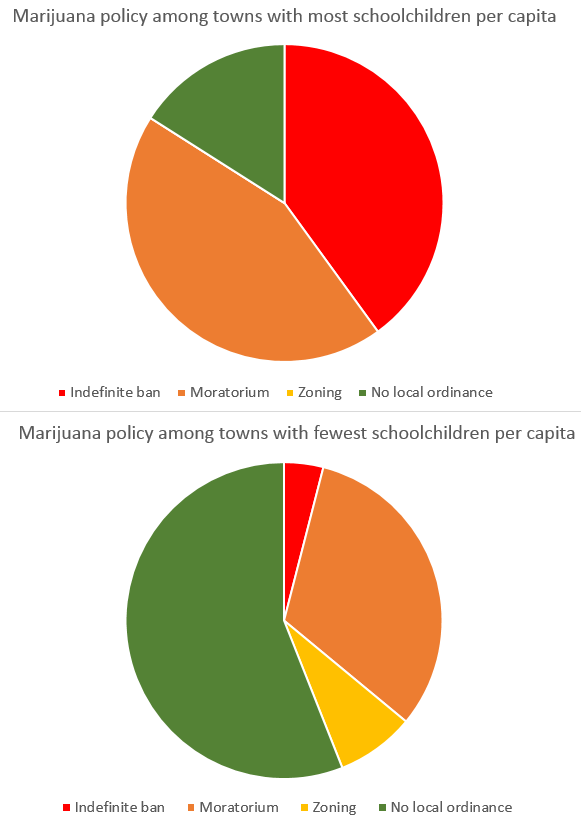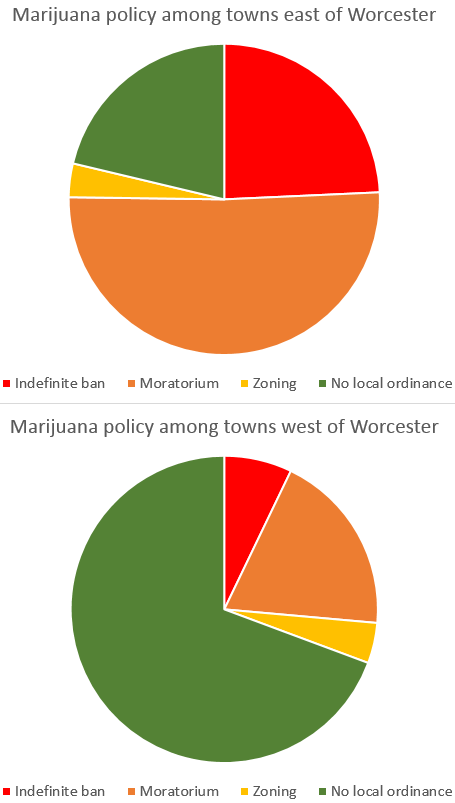Many Massachusetts towns choosing to forego marijuana tax revenue
Local officials, health advocates, and neighborhood group leaders in Massachusetts have long been wary of July 1st, 2018, the day marijuana enterprises will begin selling their products statewide. Drug deals will take place over retail countertops, not in back alleys. Home cultivators will be subject to safety inspections, not arrests.
That is true, of course, unless your local government has anything to say about it. As reported by The Boston Globe in March, 130 out of 351 Massachusetts cities and towns have imposed moratoriums on marijuana establishments, essentially banning them until local governments can find a more effective way to regulate the industry (Figure 1). At least 59 more municipalities have banned marijuana enterprises indefinitely. Despite passing question #4 on the 2016 election ballot, the residents of some Massachusetts towns seem to think marijuana retailers belong in every community but theirs.
Figure 1:

There are legitimate reasons to want to control marijuana sales. Backlash from residents is imminent because of nuisance complaints, such as odors and second-hand exposure. Zoning ordinances can help control where marijuana retailers are allowed to set up shop, and at least 13 towns and cities have already passed such legislation. Integrating marijuana enterprises into the zoning code also establishes a legal process for being able to sell the product.
Despite these formalities, the most pressing reason for controlling marijuana sales is to protect children from exposure to and normalization of the product. It’s no accident that the 25 Massachusetts municipalities with the highest concentration of school-aged children are far more likely to ban and restrict marijuana than the 25 with the lowest concentration of young kids (Figure 2). The school-aged children data is taken from PioneerInstitute’s MassAnalysis database.
Figure 2:
Marijuana policy among towns with the most schoolchildren per capita
| Marijuana policy* | Number of towns | List of towns |
| Indefinite ban | 10 | Lawrence, Lexington, Medfield, Norwell, Sherborn, Southborough, Westborough, Weston, Westwood, Winchester |
| Moratorium | 11 | Acton, Bolton, Boxford, Brockton, Cohasset, Duxbury, Holliston, Hopkinton, Needham, Sharon, Wellesley |
| Zoning | 0 | |
| No local ordinance | 4 | Dover, Hingham, Rutland, Westfield |
Marijuana policy among towns with the fewest schoolchildren per capita
| Marijuana policy* | Number of towns | List of towns |
| Indefinite ban | 1 | Randolph |
| Moratorium | 8 | Chatham, Essex, Manchester-by-the-Sea, Middlefield, Millville, Orleans, Richmond, Somerville |
| Zoning | 2 | Amherst, Provincetown |
| No local ordinance | 14 | Alford, Bellingham, Blackstone, Cambridge, Gosnold, Holbrook, Leverett, Mount Washington, New Salem, Petersham, Shutesbury, Watertown, Wendell, Worthington |
*Updated through March 2018

A restrictive approach might make sense for well-established residential communities. Marijuana retail has the potential to transform the character of a town as well as attract the wrong kinds of visitors. Unfortunately, many of the same leafy suburbs that most adamantly restrict marijuana retail have accrued large amounts of debt. Weston and Westborough come to mind. Proponents of marijuana legalization have cited tax revenue as a major reason why legalization would benefit society as a whole and, ironically, a lot of Massachusetts municipalities are missing out on it. Expressing debt as a percentage of total budget, the figure below compares marijuana policy in the 25 most heavily indebted towns with that of the 25 least indebted towns (Figure 3).
Figure 3:
Marijuana policy among most heavily indebted municipalities
| Marijuana policy* | Number of towns | List of towns |
| Indefinite ban | 6 | Bridgewater, Chelmsford, Merrimac, Sturbridge, Westborough, Weston |
| Moratorium | 11 | Acton, Ashland, Canton, Chatham, Cohasset, Gloucester, Lee, Mashpee, Natick, Stockbridge, Sutton |
| Zoning | 1 | Provincetown |
| No local ordinance | 7 | Cummington, Haverhill, Rutland, Sunderland, Watertown, Wellfleet, Worcester |
Marijuana policy among least indebted municipalities
| Marijuana policy* | Number of towns | List of towns |
| Indefinite ban | 0 | |
| Moratorium | 6 | Ashby, Hubbardston, Montgomery, Northfield, Rehoboth, Shelburne |
| Zoning | 0 | |
| No local ordinance | 19 | Alford, Colrain, Dighton, Florida, Goshen, Gosnold, Hancock, Leyden, Monroe, Mount Washington, New Ashford, New Braintree, Otis, Rowe, Royalston, Sandisfield, Sheffield, Wales, Worthington |
*Updated through March 2018

The concerning trend is that municipalities that most need the tax revenue from recreational marijuana are disproportionately banning its retail sale. However, there’s one constituency that has embraced marijuana’s economic development potential with open arms: rural towns.
While marijuana can be a nuisance to quiet residential suburbs, it can also resurrect the economies of far-flung, rapidly aging communities. In other words, marijuana legalization is good for Western Massachusetts, and the region’s leaders know it. Another potential factor is that nuisance complaints related to odors and second-hand exposure may be less relevant in sparsely populated Western Massachusetts. Below are charts comparing marijuana policy in towns west of Worcester and east of Worcester (Figure 4).
Figure 4:

The marijuana industry is changing quickly, and towns and cities are changing quickly to accommodate it. Many of the moratoriums put in place by local municipalities expire on July 1st and, inevitably, some of those towns will eventually allow marijuana retail. Moratoriums are often a mechanism to allow city leaders more time to negotiate zoning amendments and regulations for the industry.
Still, some communities currently locked in moratorium are considering outright bans. Such decisions will inevitably influence whether people continue to buy drugs laced with chemicals from underground dealers or do so safely and in a way that allows the Commonwealth to profit. Either way, Massachusetts’s legal marijuana era has thus far been characterized by local control.
For more insight into factors that affect drug policy, explore Pioneer Institute’s MassAnalysis database.
Andrew Mikula is the Roger Perry Government Transparency intern at Pioneer Institute. He studies economics at Bates College.



